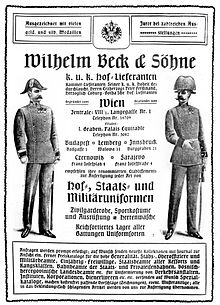Wilhelm Beck & Sons
| Wilhelm Beck & Sons | |
|---|---|
| legal form | |
| founding | 1849 |
| Seat | Vienna |
| Branch | retail trade |
Wilhelm Beck & Sons was an important manufacturer of uniforms and types of uniform during the Austro-Hungarian monarchy . The head office was at Langen Gasse 1 in Vienna's 8th district, Josefstadt .
history
The founder Wilhelm Beck started selling his own men's and boys' clothing in an old house at Langegasse 1 in Vienna's 8th district in 1849 . Although his business was of a modest size in the beginning, it grew over the years from a craft business to a commercial business and later to large-scale industry. Thanks to his skill and flair for business, he was soon able to lead the business to great success. In 1869 he was already able to buy the house in which the business had previously been housed in rented premises. Two years later, his two sons Hermann and Adolf joined the company as public shareholders, and the name changed to “Wilhelm Beck & Sons”. Hermann and Adolf Beck already had extensive knowledge of the company and became an integral part of the company. The company continued to expand with the move to the uniforms industry and the manufacture of uniform articles on a larger scale. The uniforms branch as an independent branch of industry was still in its early stages, so orienting oneself in this new area was a risk for the entrepreneur Beck. With the mandatory introduction of the uniform for Austrian state officials, there was suddenly a significantly increased need for a wide variety of articles of this type. The Becks' expectations of the future development of this line of business were thus far exceeded.
As early as 1899, the company had a defeat in the inner city of Vienna . Originally the defeat was on the Seilerstätte, in 1890 it moved to the then newly built Palais Equitable on Stephansplatz. The shop was known for its representative elegance and furnishings and was one of the sights in Vienna.
The founder Wilhelm Beck was awarded the gold cross of merit and the large gold Salvator medal for his many years of charitable work . Even before the defeat at Stephansplatz opened, he retired into private life and left the company to his sons alone. Soon after, in 1893, Hermann Beck took his son Otto into the company. The old head office on Langegasse was rebuilt in 1896 due to the expansion of the business and in its place a large, modern-style department store rose, which also housed the company's offices. The company turned to the manufacture of uniforms, headgear and furrier goods , which from now on formed a separate line of business alongside the production of entire uniforms. In 1901, production was relocated to the newly built factory building at Hirschengasse 25, in the 6th district of Mariahilf , which was equipped with the most modern facilities at the time . Around this time, two other sons of the two older company owners, Edmund and Arthur Beck, joined the company. Edmund Beck worked in the factory in the 6th district, Arthur Beck in the defeat on Stephansplatz.
According to self-promotion, the company manufactured embroidered court, diplomatic, state and military uniforms as well as the most elegant civil wardrobe and lingerie, sports costumes and equipment and liveries.
The company was one of the most important in its branch in Austria-Hungary. Around 1900 she employed around 60 civil servants and 5,000–6,000 people and began to establish business relationships abroad. There were representations in Belgrade , Sofia and Constantinople . In 1902 own branches were set up at Walowa 11 in Lemberg , at Franz Josef-Platz 4 in Chernivtsi , Pressburg and Josefstadt . Another branch already existed at Burggraben 21 in Innsbruck . The company's products have been awarded first or second prizes at almost all exhibitions in which it has participated.
For these merits and the first-class quality of the products, the company Wilhelm Beck & Sons was appointed as kuk court and chamber supplier , it was also an archducal chamber supplier and ducal Coburg court supplier.
The First World War and the collapse of the monarchy in 1918 brought hard times for the company as the sales market collapsed. The abolition of the uniform requirement for a large part of the civil servants in the Republic of Austria forced the company to close in the end.
Individual evidence
- ^ Wilhelm Beck & Sons. In: Anniversary number of the imperial Wiener Zeitung 1703-1903. Supplement commercial part. Alfred von Lindheim. Druck und Verlag KK Hof- und Staatsdruckerei, Vienna, August 8, 1903, p. 34 , accessed on May 12, 2009 .
Coordinates: 48 ° 12 '24 " N , 16 ° 21' 10.4" E



